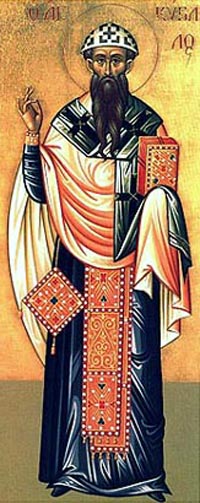
Name: Cyril of Alexandria
When: c. 376 – 444
Where: Patriarch of Alexandria in Egypt
So what?
Cyril was at the centre of one of the most complicated debates in the history of the Church. Previous generations had established that the man Jesus was the divine Son of God. But now the difficulty was: in what sense was Jesus both human and divine? It’s actually a hard question to answer when you think about it!
In Cyril’s time, there were two basic camps, with two extreme wings in each camp:
Cyril was the champion of the Antiochene group. He defended brilliantly (and, at times, extremely aggressively) the truth that there was only one person Jesus. At a time when Nestorianism was gaining ground, he insisted that there was not a separate divine-Jesus and human-Jesus. But he was considerably more moderate than the ideas that would become known as “Eutychanism”.
In the end, long after Cyril’s death, a compromise was reached which virtually no one at the time was happy with, and yet which has become accepted in the Orthodox, Roman and Protestant churches. At the Council of Chalcedon in 451AD, a distinction was made between Jesus “nature” and “person”. The Council agreed that Jesus has two “natures”, divine and human, which are distinct but act in agreement with each other. The Greek word for “nature” is physis. (Confusingly, this is the word Cyril had used for “person”.) It also agreed that that Jesus has these two natures in one “person”. There is only one Jesus. The Greek word for “person” is hypostasis.
Today, we might wonder: why all the fuss? To some extent, a lot of the controversy was due to the way people used words (Cyril said “physis” when he meant person, the Antiochenes used “physis” to mean nature). But it was necessary to find a way of expressing the truth that Jesus is fully God and fully man (not two different people, nor God taking over a man). Otherwise, we could easily tip in our thinking into the problems each side saw in the other’s teaching: either that Jesus was not really a man, with a man’s mind, and therefore unable to obey on our behalf or die on our behalf; or that Jesus’ human weaknesses (tiredness, vulnerability) applied to his divine nature too, thus making him less than God.
Random fact: Cyril aroused great hatred in his opponents. When he died, one told the funeral organizer to put a large stone on his grave, to make very sure he couldn’t come out!
Good quote: The Word … thought it good that he should make himself human, and in his own person display our humanity glorified by the majesty of his deity.
Prayer of thanks: Father, thank you that your Son became a man. Thank you that Jesus is fully man, and fully God – that he knows what it is like to have a human nature and body, and that he is able to show God fully to us, because he is God. Amen.